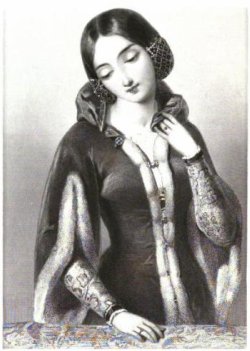
Anne of Bohemia, Queen of England
Born: May 11, 1366
Prague, Holy Roman Empire
Died: June 7, 1394
Sheen, Surrey, England (Age 28)
Anne in History
As most women of royal families in the Middle Ages, Anne of Bohemia was used as a political tool by her male relatives. She was the daughter of Holy Roman Emperor Charles IV and the sister of Wenzel, King of the Romans. It was suggested by Pope Urban VI that Anne should marry King Richard II of England to form an alliance between the the island nation and the Roman Empire, which would put Urban in a highly advantageous position against a rival Pope, Clement VII, during the Papal Schism. The marriage between Anne and Richard took place in January 1382 and was not a popular match with the English people at first, considering the fact that Anne brought no dowry, and Richard actually loaned her brother Wenzel a large amount of cash. In addition, the king also spent lavishly on his new in-laws and many other Bohemians who had come to court with Anne. However, many began to see Anne's kind nature and grew accustomed to her. She acted as a mediator on a number of occasions, most notably at the Merciless Parliament (1388), where she pleaded with the controlling lords appellant for the lives of Simon Burley and several others (unsuccessfully in the former's case). The relationship between Anne and Richard was widely believed to have been a happy one, despite the fact that no children were produced, sparking rumors that Anne was infertile and/or the king was a possible homosexual. When Anne died, most likely of plague, in 1394, Richard was genuinely devastated and took out his fury on the Earl of Arundel, who showed up late for the funeral and received a smash on the head for his insult. Anne's death is said by many historians to have driven the king insane and to have led to much of his tyrannical behavior in the upcoming years.
Anne in Woodstock
Within the second scene of Thomas of Woodstock, Anne O'Beame and Richard II are married, much to the joy of all at court. Anne proves to be a generous and compassionate person who helps the poor in any way she can and acts as a moderator to her husband when it seems as if his behavior is becoming erratic. Unfortunately, Anne dies prematurely, leaving the king despondent. Within the play, Anne dies before the rebellion against the king, while historically, she dies after. The timing in the play is off throughout and events from 1387-88 and 1397 are conflated, making it a bit confusing for the reader.
References
Saul, Nigel. ‘Anne (1366–1394)’, Oxford Dictionary of National Biography, online edn, Oxford University Press, Sept 2004 [http://www.oxforddnb.com/view/article/555, accessed 29 June 2010]